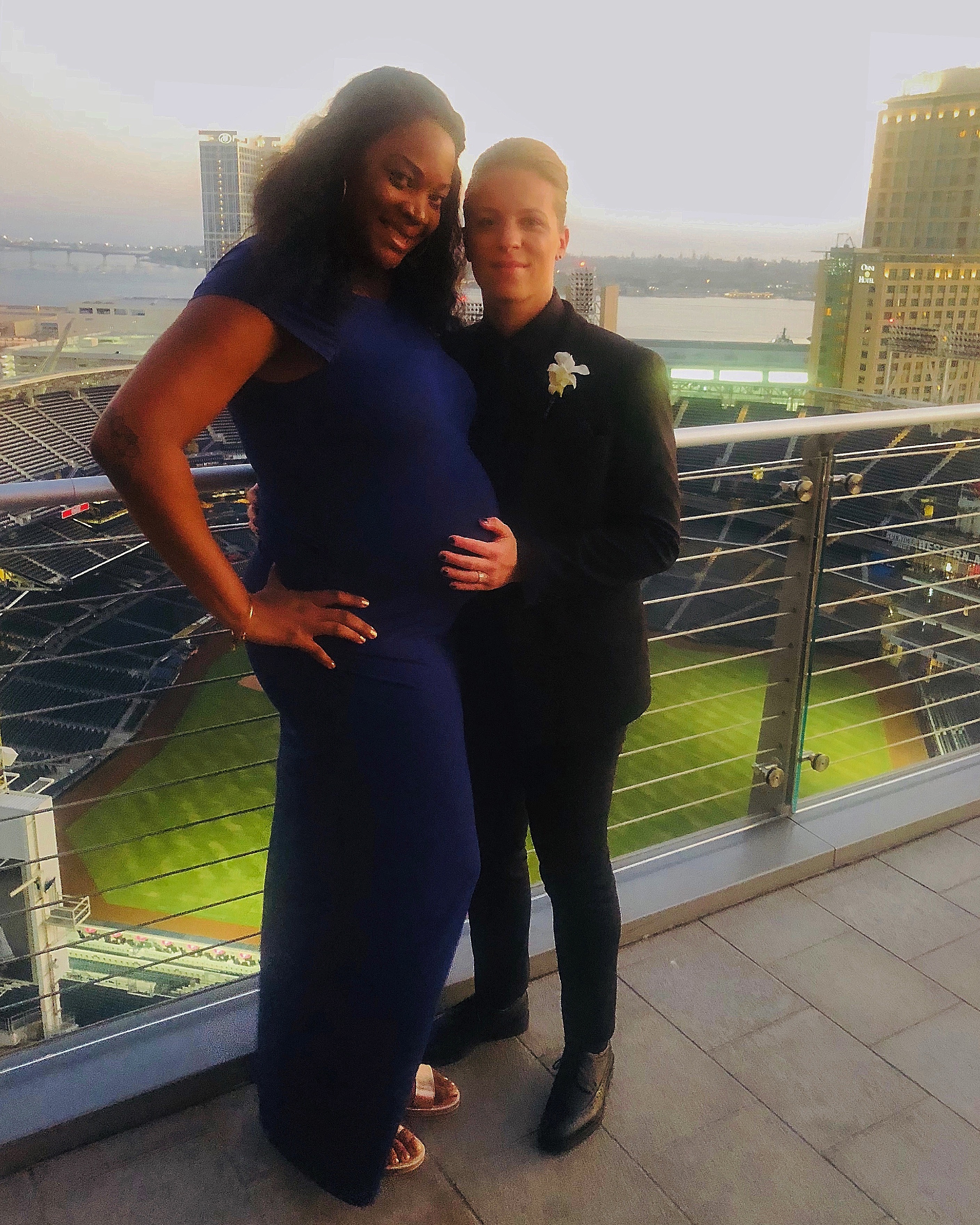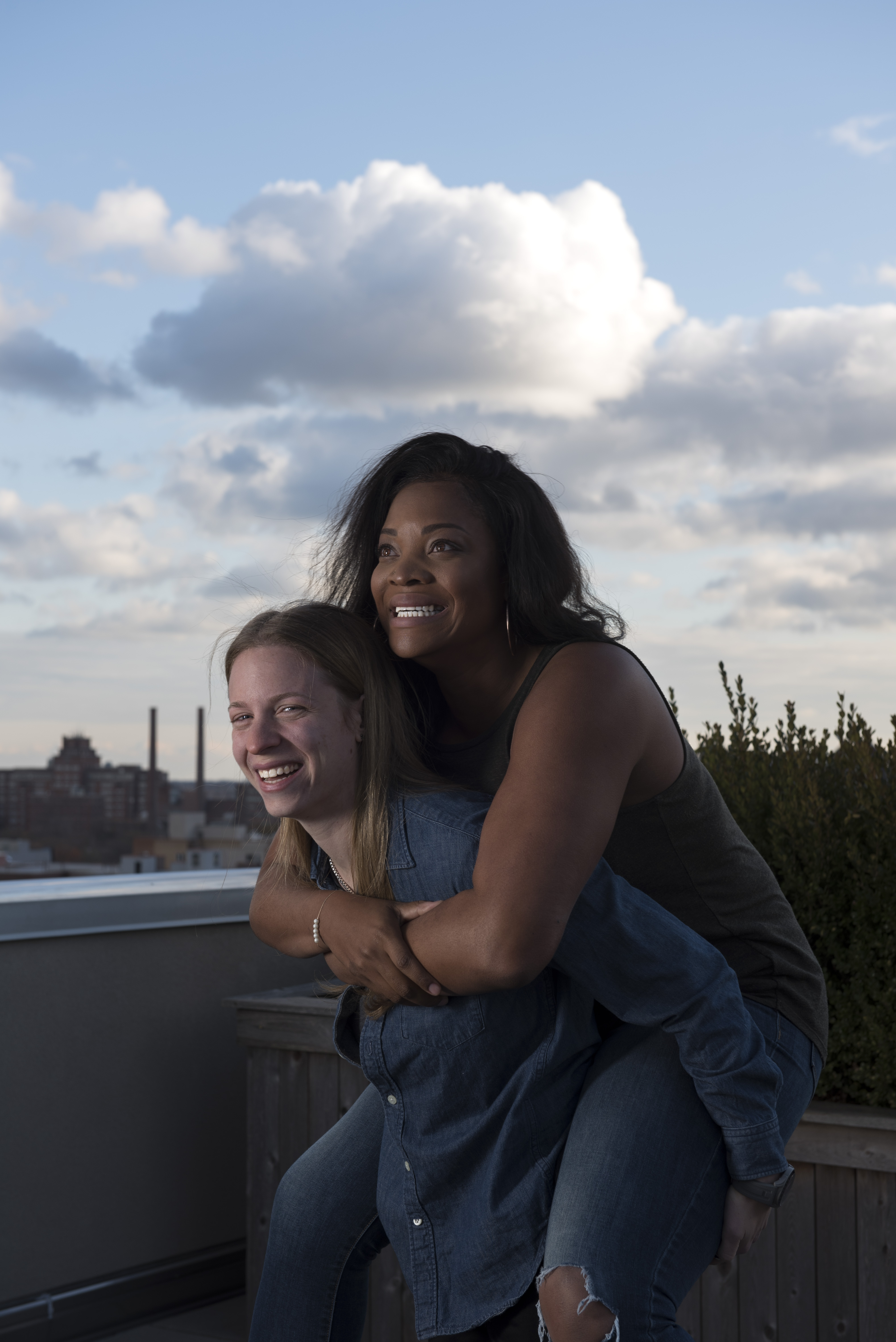Real Couple Stories: Erica & Alana Talk Raising A Black Son As Two Lesbian Women

MN: How did you go about choosing a donor? Was race a part of the discussion? What was it that you liked about the donor that you chose?
Erica: I initially wanted a donor who looked like they could have been related to Alana. So she’s Jewish, so I wanted someone Jewish.
Alana: And I was like, ‘Then you get every chromosomal disorder on earth. Please don’t check that box.’
Erica: And when you check it, it goes from 100 guys to like four. I was like, ‘Alright, he doesn’t have to be a Jew. I can let that go.’ But then trying to find someone who was smart and seemed caring. You’re trying to figure out all these qualities reading a profile.
Alana: You’re skipping ahead of yourself. Erica was deadset on this donor looking like me. I said the entire time I literally said, ‘I do not care. All I want is a healthy baby. I couldn’t give a sh*t if my kid was bright red, I would be happy, all I want is a healthy baby. For me, what was more important was clean, family medical history, no history of mental illness. I was more concerned with the genetic part of it. Erica was like, ‘I want a blond haired, blue-eyed person.’
Erica: I was concerned about the family history but if there was a way for us to make a person, with our two eggs, I wanted our baby to be what would happen.
Alana: So we had picked out three people that we liked. They were all White, with varying skin tone and hair color and then we went to the fertility doctor and she asked if they had done genetic testing. And we said, ‘We don’t know.’ And we checked and none of them did. And the doctor said, ‘Well, the cryobank is offering free genetic testing on all the new sperm they’re releasing, you can have free genetic testing on the donor. So we went back and looked again and our donor is half Black and half White. So our son will be ¾ Black and ¼ White.
Erica: What’s interesting about this is they give you pictures of them as children but they also give you celebrities and athletes that the people at the cryobank think they look like as adults. Our sperm donor is half Black, half White but all of his celebrities are Hispanic men. So we’re not really sure what our kid is going to look like.
Alana: While I tell you that I don’t care at all what shade this kid is, I do know that raising a young, Black man in America–there will be things I can teach him about being a good person and being smart and having good values and morals but I cannot relate to him on any level of what it means to be Black in America. That is something we talk about all of the time.
Erica: I sort of had a moment of panic a few months ago, right after we found out he was a boy– about the fact that most of the people in our circle are women. Most of our friends are other lesbian couples. And all of our friends who have had babies, are girls. So, we’re bringing a boy into a very female-saturated environment. Which I think is great. But, especially now, he’s going to need men and men of color to tell him, ‘No, this is how you act as a man. This is how you act as a good man.’
My family and my closest male friends are all still in Maryland. I feel better about it now, but I really kind of struggled and asked, ‘Who do we know?’
Alana: Even though we’re saying that our son will need a strong male role model so he knows how to act like a man. I hate that that’s a thing. Because acting like a man? What does that mean? It’s a society built concept. For me, as long as we make a good human, that’s all I care about. But I’m not naive and I know how the world is and I know how America is. Like, the other part of this expensive conversation is even though I’ll be on the birth certificate, I, in theory, still have to adopt my own child because not every state recognizes the second parent on the birth certificate when it’s two women.
MN: What do you think are some of the positive aspects of growing up around so much feminine energy?
Alana: My hope is that he’s open and okay with being sensitive and talking about his feelings and feeling 100 percent okay to express himself, in any scenario regardless of what he may be feeling.
Erica: I want him to be emotionally aware and I want him to understand and value what women have to say and the role that women play in society. I think now, that’s something that’s very lost in young men and even older men. It’s this sense of ‘Oh, well they’re just women.’ And for me, I’m like at the end of the day, we wouldn’t have men if we didn’t have women. And that’s the thing I want him to really understand is that everyone is equal. Everyone can be what they want to be and do the things they want to do in this life. And everyone deserves that respect, it doesn’t matter what your gender is…
Alana: …or what your race is.
Erica: Everyone deserves the opportunity to be heard and listened to and understood.
Alana: And my hope is that he exists in a way where he treats everybody with respect. Who knows who he’ll want to date, but if he wants to date women, he’ll be very in tune with the right way to treat everybody and in turn, women. Whether it’s coworkers or his friends, he’ll be the one in the locker room to stop making bad jokes. He’ll be the one ending conversations going down a bad path.

MN: Do you foresee him having problems with parents who have an issue with him having two mothers?
Alana: 100 percent.
Erica: We’ve braced ourselves for that already.
Alana: When he starts having playdates, that’s when I can imagine it happening. I can’t imagine him getting bullied by other kids for having two moms. I would be curious to see if parents don’t want their kids to come over and have playdates because they think being a lesbian is contagious.
Erica: It’s not. We’ve figured it out. But it’s going to be about meeting parents. That’s a big part of our job, protecting our son from those people and subsequently their children.
Alana: But when he’s old enough, that’s a conversation I want to have with him. There are ways to teach him, ‘Everybody’s equal and we love everybody. And some people are just not that way and that’s one of the reasons we don’t hang out with them so much.’
MN: How do you imagine the conversations about his donor will go?
Erica: I think it’s hard to answer because we don’t know when it’s going to come. For some people’s kids, it happens when they’re six or seven. Some people’s kids actually don’t ever ask the question. The good thing about the anonymous donor is that California Cryobank will allow the child to contact the Cryobank once they are 18 and then the Cryobank will reach out to the donor to see if he wants to speak to him. But I think it’s about being honest and saying, ‘We loved each other and knew we wanted to have a baby.’ And when we picked the donor, we chose someone who we thought would be a good person.
I think the other thing we’re planning to do and we’ve actually started building a library, there are a lot of books about families to be able to make it a normal thing. And he’ll see this with all of our friends’ kids. I don’t want him to think that we’re weird because we don’t have this thing. I want him to understand that families look a lot of different ways. You have two moms but some families only have one mom or a grandma, grandpa or an uncle. You have two people that love you and care for you and that’s the important piece.









